Business Ethics of Debenhams Plc and WHSmith PLC Assignment
VerifiedAdded on 2021/01/03
|8
|1986
|400
AI Summary
Contribute Materials
Your contribution can guide someone’s learning journey. Share your
documents today.
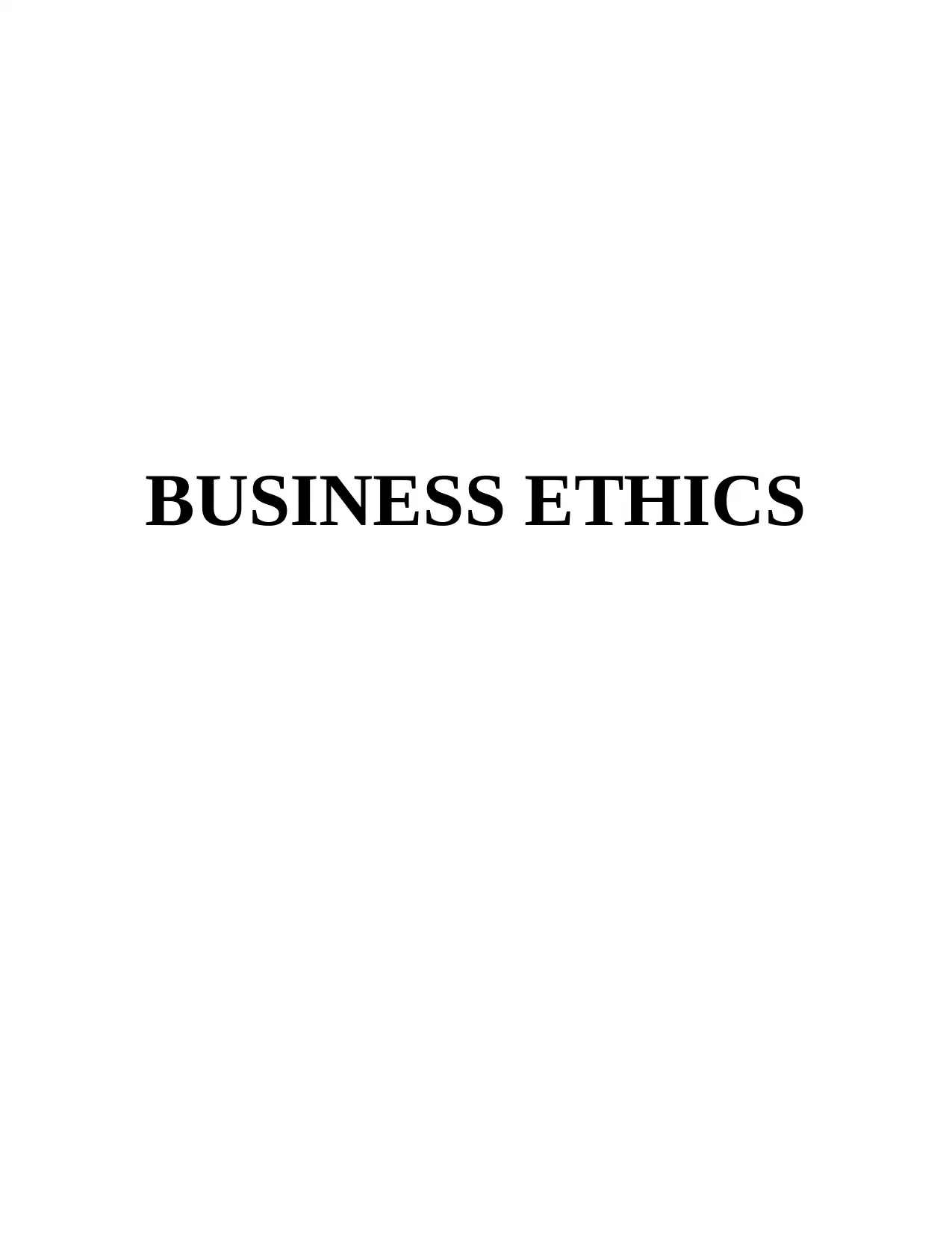
BUSINESS ETHICS
Secure Best Marks with AI Grader
Need help grading? Try our AI Grader for instant feedback on your assignments.
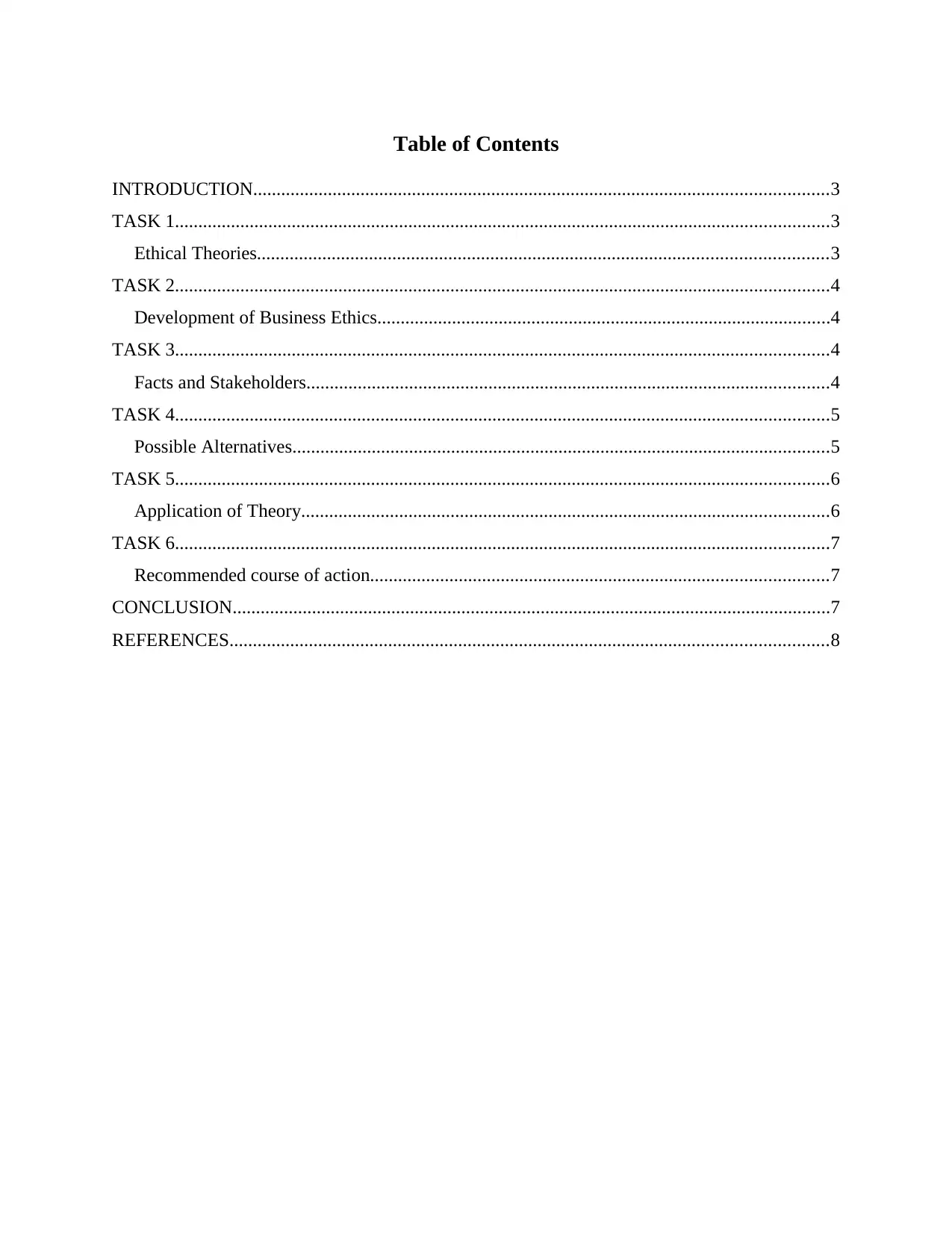
Table of Contents
INTRODUCTION...........................................................................................................................3
TASK 1............................................................................................................................................3
Ethical Theories..........................................................................................................................3
TASK 2............................................................................................................................................4
Development of Business Ethics.................................................................................................4
TASK 3............................................................................................................................................4
Facts and Stakeholders................................................................................................................4
TASK 4............................................................................................................................................5
Possible Alternatives...................................................................................................................5
TASK 5............................................................................................................................................6
Application of Theory.................................................................................................................6
TASK 6............................................................................................................................................7
Recommended course of action..................................................................................................7
CONCLUSION................................................................................................................................7
REFERENCES................................................................................................................................8
INTRODUCTION...........................................................................................................................3
TASK 1............................................................................................................................................3
Ethical Theories..........................................................................................................................3
TASK 2............................................................................................................................................4
Development of Business Ethics.................................................................................................4
TASK 3............................................................................................................................................4
Facts and Stakeholders................................................................................................................4
TASK 4............................................................................................................................................5
Possible Alternatives...................................................................................................................5
TASK 5............................................................................................................................................6
Application of Theory.................................................................................................................6
TASK 6............................................................................................................................................7
Recommended course of action..................................................................................................7
CONCLUSION................................................................................................................................7
REFERENCES................................................................................................................................8
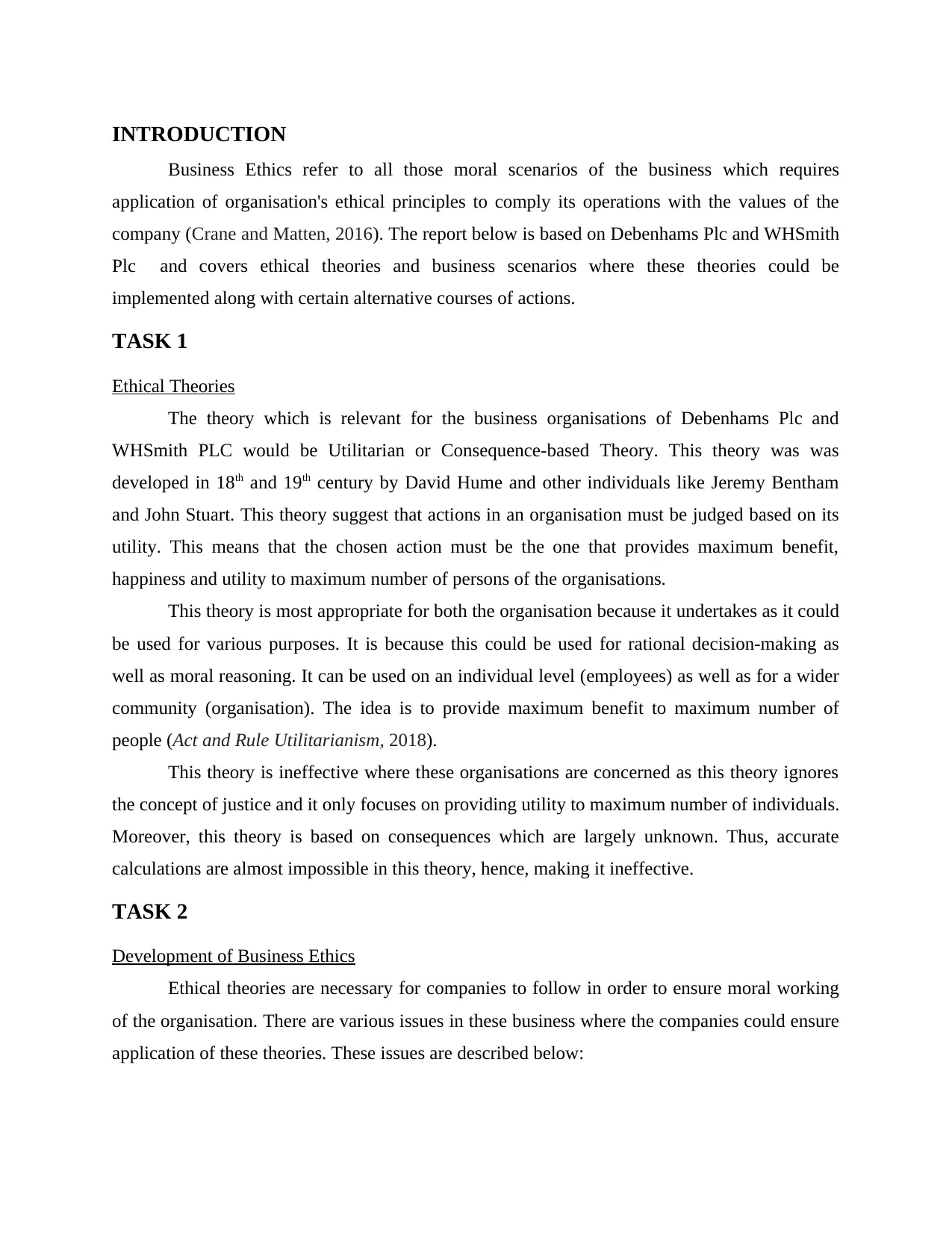
INTRODUCTION
Business Ethics refer to all those moral scenarios of the business which requires
application of organisation's ethical principles to comply its operations with the values of the
company (Crane and Matten, 2016). The report below is based on Debenhams Plc and WHSmith
Plc and covers ethical theories and business scenarios where these theories could be
implemented along with certain alternative courses of actions.
TASK 1
Ethical Theories
The theory which is relevant for the business organisations of Debenhams Plc and
WHSmith PLC would be Utilitarian or Consequence-based Theory. This theory was was
developed in 18th and 19th century by David Hume and other individuals like Jeremy Bentham
and John Stuart. This theory suggest that actions in an organisation must be judged based on its
utility. This means that the chosen action must be the one that provides maximum benefit,
happiness and utility to maximum number of persons of the organisations.
This theory is most appropriate for both the organisation because it undertakes as it could
be used for various purposes. It is because this could be used for rational decision-making as
well as moral reasoning. It can be used on an individual level (employees) as well as for a wider
community (organisation). The idea is to provide maximum benefit to maximum number of
people (Act and Rule Utilitarianism, 2018).
This theory is ineffective where these organisations are concerned as this theory ignores
the concept of justice and it only focuses on providing utility to maximum number of individuals.
Moreover, this theory is based on consequences which are largely unknown. Thus, accurate
calculations are almost impossible in this theory, hence, making it ineffective.
TASK 2
Development of Business Ethics
Ethical theories are necessary for companies to follow in order to ensure moral working
of the organisation. There are various issues in these business where the companies could ensure
application of these theories. These issues are described below:
Business Ethics refer to all those moral scenarios of the business which requires
application of organisation's ethical principles to comply its operations with the values of the
company (Crane and Matten, 2016). The report below is based on Debenhams Plc and WHSmith
Plc and covers ethical theories and business scenarios where these theories could be
implemented along with certain alternative courses of actions.
TASK 1
Ethical Theories
The theory which is relevant for the business organisations of Debenhams Plc and
WHSmith PLC would be Utilitarian or Consequence-based Theory. This theory was was
developed in 18th and 19th century by David Hume and other individuals like Jeremy Bentham
and John Stuart. This theory suggest that actions in an organisation must be judged based on its
utility. This means that the chosen action must be the one that provides maximum benefit,
happiness and utility to maximum number of persons of the organisations.
This theory is most appropriate for both the organisation because it undertakes as it could
be used for various purposes. It is because this could be used for rational decision-making as
well as moral reasoning. It can be used on an individual level (employees) as well as for a wider
community (organisation). The idea is to provide maximum benefit to maximum number of
people (Act and Rule Utilitarianism, 2018).
This theory is ineffective where these organisations are concerned as this theory ignores
the concept of justice and it only focuses on providing utility to maximum number of individuals.
Moreover, this theory is based on consequences which are largely unknown. Thus, accurate
calculations are almost impossible in this theory, hence, making it ineffective.
TASK 2
Development of Business Ethics
Ethical theories are necessary for companies to follow in order to ensure moral working
of the organisation. There are various issues in these business where the companies could ensure
application of these theories. These issues are described below:
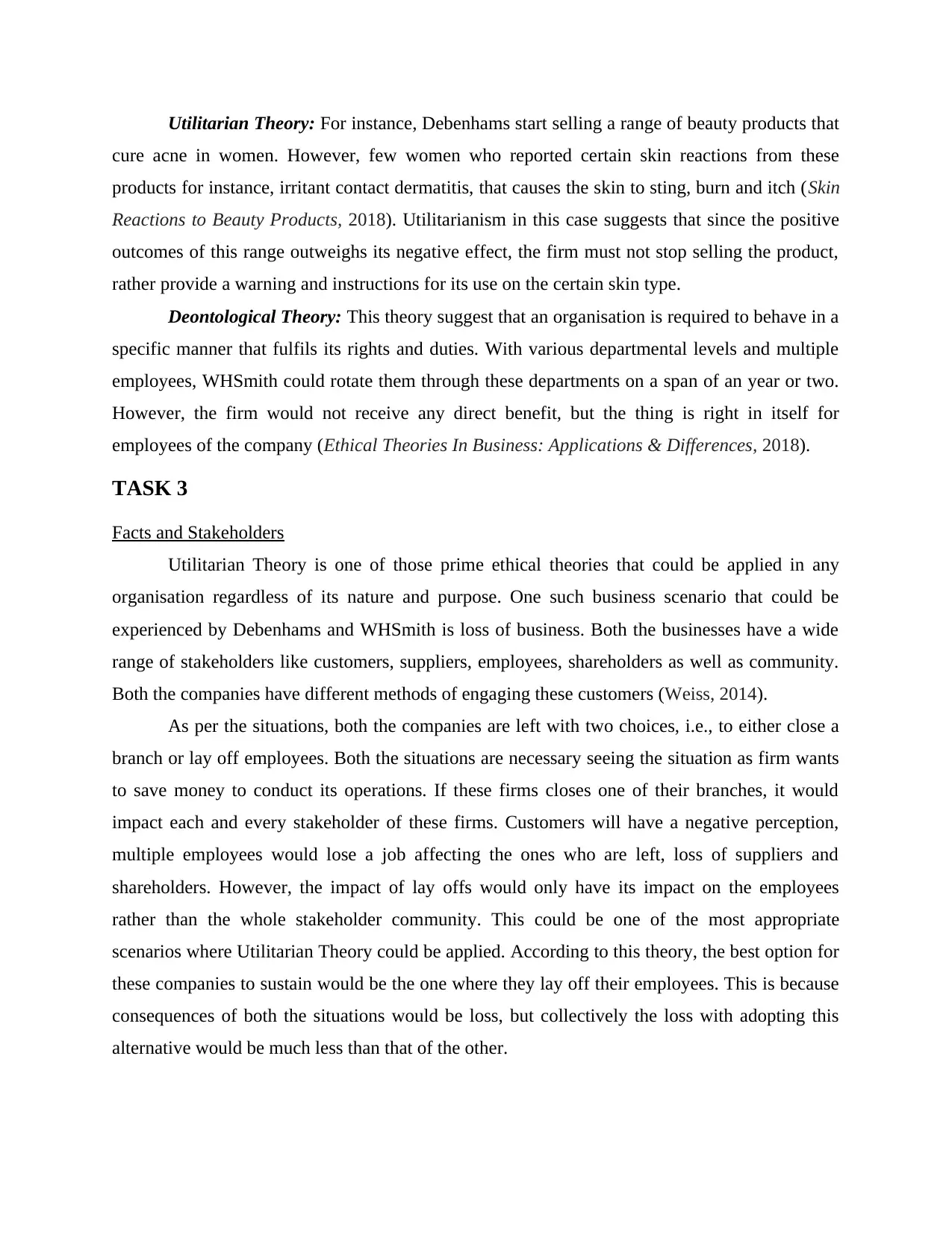
Utilitarian Theory: For instance, Debenhams start selling a range of beauty products that
cure acne in women. However, few women who reported certain skin reactions from these
products for instance, irritant contact dermatitis, that causes the skin to sting, burn and itch (Skin
Reactions to Beauty Products, 2018). Utilitarianism in this case suggests that since the positive
outcomes of this range outweighs its negative effect, the firm must not stop selling the product,
rather provide a warning and instructions for its use on the certain skin type.
Deontological Theory: This theory suggest that an organisation is required to behave in a
specific manner that fulfils its rights and duties. With various departmental levels and multiple
employees, WHSmith could rotate them through these departments on a span of an year or two.
However, the firm would not receive any direct benefit, but the thing is right in itself for
employees of the company (Ethical Theories In Business: Applications & Differences, 2018).
TASK 3
Facts and Stakeholders
Utilitarian Theory is one of those prime ethical theories that could be applied in any
organisation regardless of its nature and purpose. One such business scenario that could be
experienced by Debenhams and WHSmith is loss of business. Both the businesses have a wide
range of stakeholders like customers, suppliers, employees, shareholders as well as community.
Both the companies have different methods of engaging these customers (Weiss, 2014).
As per the situations, both the companies are left with two choices, i.e., to either close a
branch or lay off employees. Both the situations are necessary seeing the situation as firm wants
to save money to conduct its operations. If these firms closes one of their branches, it would
impact each and every stakeholder of these firms. Customers will have a negative perception,
multiple employees would lose a job affecting the ones who are left, loss of suppliers and
shareholders. However, the impact of lay offs would only have its impact on the employees
rather than the whole stakeholder community. This could be one of the most appropriate
scenarios where Utilitarian Theory could be applied. According to this theory, the best option for
these companies to sustain would be the one where they lay off their employees. This is because
consequences of both the situations would be loss, but collectively the loss with adopting this
alternative would be much less than that of the other.
cure acne in women. However, few women who reported certain skin reactions from these
products for instance, irritant contact dermatitis, that causes the skin to sting, burn and itch (Skin
Reactions to Beauty Products, 2018). Utilitarianism in this case suggests that since the positive
outcomes of this range outweighs its negative effect, the firm must not stop selling the product,
rather provide a warning and instructions for its use on the certain skin type.
Deontological Theory: This theory suggest that an organisation is required to behave in a
specific manner that fulfils its rights and duties. With various departmental levels and multiple
employees, WHSmith could rotate them through these departments on a span of an year or two.
However, the firm would not receive any direct benefit, but the thing is right in itself for
employees of the company (Ethical Theories In Business: Applications & Differences, 2018).
TASK 3
Facts and Stakeholders
Utilitarian Theory is one of those prime ethical theories that could be applied in any
organisation regardless of its nature and purpose. One such business scenario that could be
experienced by Debenhams and WHSmith is loss of business. Both the businesses have a wide
range of stakeholders like customers, suppliers, employees, shareholders as well as community.
Both the companies have different methods of engaging these customers (Weiss, 2014).
As per the situations, both the companies are left with two choices, i.e., to either close a
branch or lay off employees. Both the situations are necessary seeing the situation as firm wants
to save money to conduct its operations. If these firms closes one of their branches, it would
impact each and every stakeholder of these firms. Customers will have a negative perception,
multiple employees would lose a job affecting the ones who are left, loss of suppliers and
shareholders. However, the impact of lay offs would only have its impact on the employees
rather than the whole stakeholder community. This could be one of the most appropriate
scenarios where Utilitarian Theory could be applied. According to this theory, the best option for
these companies to sustain would be the one where they lay off their employees. This is because
consequences of both the situations would be loss, but collectively the loss with adopting this
alternative would be much less than that of the other.
Secure Best Marks with AI Grader
Need help grading? Try our AI Grader for instant feedback on your assignments.
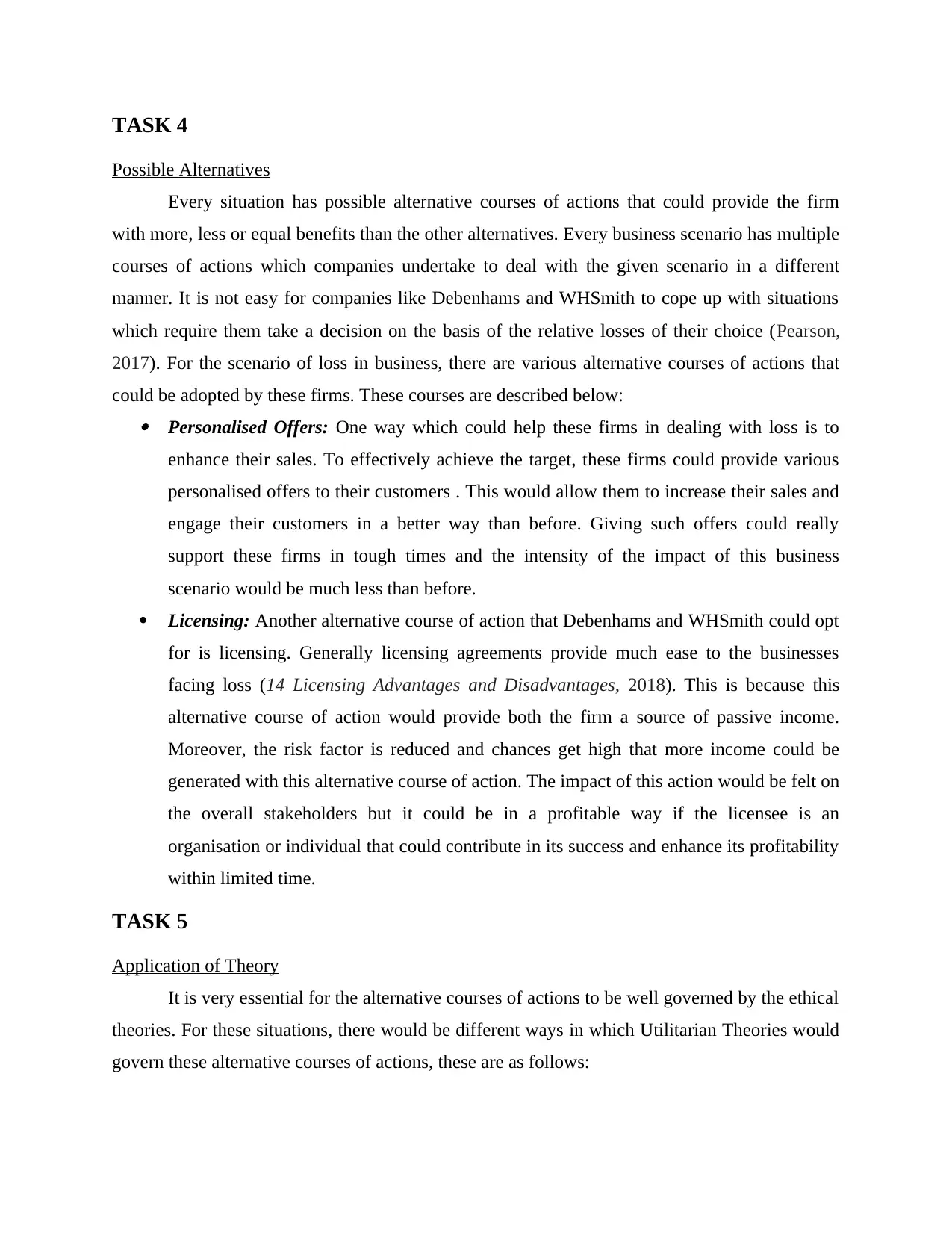
TASK 4
Possible Alternatives
Every situation has possible alternative courses of actions that could provide the firm
with more, less or equal benefits than the other alternatives. Every business scenario has multiple
courses of actions which companies undertake to deal with the given scenario in a different
manner. It is not easy for companies like Debenhams and WHSmith to cope up with situations
which require them take a decision on the basis of the relative losses of their choice (Pearson,
2017). For the scenario of loss in business, there are various alternative courses of actions that
could be adopted by these firms. These courses are described below: Personalised Offers: One way which could help these firms in dealing with loss is to
enhance their sales. To effectively achieve the target, these firms could provide various
personalised offers to their customers . This would allow them to increase their sales and
engage their customers in a better way than before. Giving such offers could really
support these firms in tough times and the intensity of the impact of this business
scenario would be much less than before.
Licensing: Another alternative course of action that Debenhams and WHSmith could opt
for is licensing. Generally licensing agreements provide much ease to the businesses
facing loss (14 Licensing Advantages and Disadvantages, 2018). This is because this
alternative course of action would provide both the firm a source of passive income.
Moreover, the risk factor is reduced and chances get high that more income could be
generated with this alternative course of action. The impact of this action would be felt on
the overall stakeholders but it could be in a profitable way if the licensee is an
organisation or individual that could contribute in its success and enhance its profitability
within limited time.
TASK 5
Application of Theory
It is very essential for the alternative courses of actions to be well governed by the ethical
theories. For these situations, there would be different ways in which Utilitarian Theories would
govern these alternative courses of actions, these are as follows:
Possible Alternatives
Every situation has possible alternative courses of actions that could provide the firm
with more, less or equal benefits than the other alternatives. Every business scenario has multiple
courses of actions which companies undertake to deal with the given scenario in a different
manner. It is not easy for companies like Debenhams and WHSmith to cope up with situations
which require them take a decision on the basis of the relative losses of their choice (Pearson,
2017). For the scenario of loss in business, there are various alternative courses of actions that
could be adopted by these firms. These courses are described below: Personalised Offers: One way which could help these firms in dealing with loss is to
enhance their sales. To effectively achieve the target, these firms could provide various
personalised offers to their customers . This would allow them to increase their sales and
engage their customers in a better way than before. Giving such offers could really
support these firms in tough times and the intensity of the impact of this business
scenario would be much less than before.
Licensing: Another alternative course of action that Debenhams and WHSmith could opt
for is licensing. Generally licensing agreements provide much ease to the businesses
facing loss (14 Licensing Advantages and Disadvantages, 2018). This is because this
alternative course of action would provide both the firm a source of passive income.
Moreover, the risk factor is reduced and chances get high that more income could be
generated with this alternative course of action. The impact of this action would be felt on
the overall stakeholders but it could be in a profitable way if the licensee is an
organisation or individual that could contribute in its success and enhance its profitability
within limited time.
TASK 5
Application of Theory
It is very essential for the alternative courses of actions to be well governed by the ethical
theories. For these situations, there would be different ways in which Utilitarian Theories would
govern these alternative courses of actions, these are as follows:
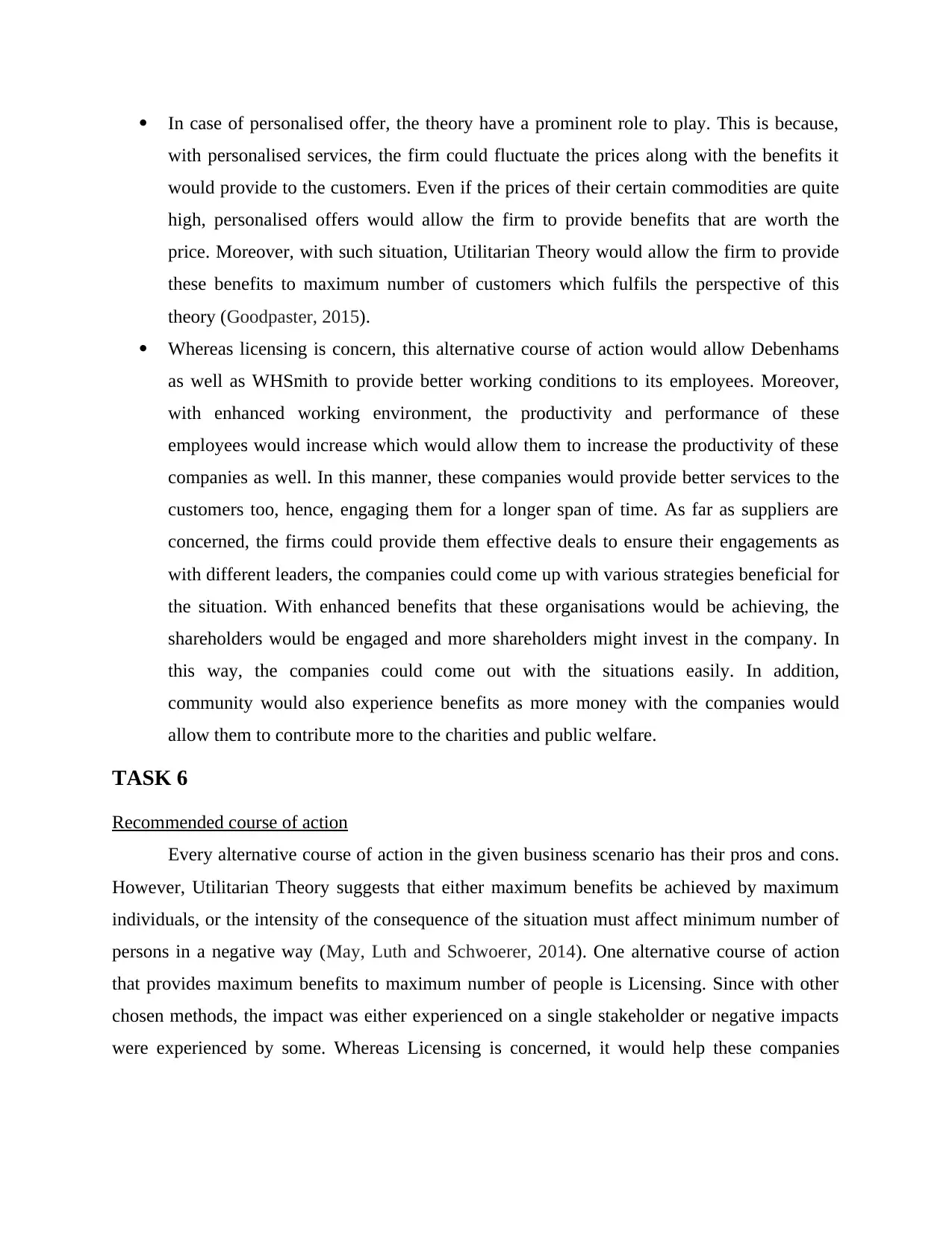
In case of personalised offer, the theory have a prominent role to play. This is because,
with personalised services, the firm could fluctuate the prices along with the benefits it
would provide to the customers. Even if the prices of their certain commodities are quite
high, personalised offers would allow the firm to provide benefits that are worth the
price. Moreover, with such situation, Utilitarian Theory would allow the firm to provide
these benefits to maximum number of customers which fulfils the perspective of this
theory (Goodpaster, 2015).
Whereas licensing is concern, this alternative course of action would allow Debenhams
as well as WHSmith to provide better working conditions to its employees. Moreover,
with enhanced working environment, the productivity and performance of these
employees would increase which would allow them to increase the productivity of these
companies as well. In this manner, these companies would provide better services to the
customers too, hence, engaging them for a longer span of time. As far as suppliers are
concerned, the firms could provide them effective deals to ensure their engagements as
with different leaders, the companies could come up with various strategies beneficial for
the situation. With enhanced benefits that these organisations would be achieving, the
shareholders would be engaged and more shareholders might invest in the company. In
this way, the companies could come out with the situations easily. In addition,
community would also experience benefits as more money with the companies would
allow them to contribute more to the charities and public welfare.
TASK 6
Recommended course of action
Every alternative course of action in the given business scenario has their pros and cons.
However, Utilitarian Theory suggests that either maximum benefits be achieved by maximum
individuals, or the intensity of the consequence of the situation must affect minimum number of
persons in a negative way (May, Luth and Schwoerer, 2014). One alternative course of action
that provides maximum benefits to maximum number of people is Licensing. Since with other
chosen methods, the impact was either experienced on a single stakeholder or negative impacts
were experienced by some. Whereas Licensing is concerned, it would help these companies
with personalised services, the firm could fluctuate the prices along with the benefits it
would provide to the customers. Even if the prices of their certain commodities are quite
high, personalised offers would allow the firm to provide benefits that are worth the
price. Moreover, with such situation, Utilitarian Theory would allow the firm to provide
these benefits to maximum number of customers which fulfils the perspective of this
theory (Goodpaster, 2015).
Whereas licensing is concern, this alternative course of action would allow Debenhams
as well as WHSmith to provide better working conditions to its employees. Moreover,
with enhanced working environment, the productivity and performance of these
employees would increase which would allow them to increase the productivity of these
companies as well. In this manner, these companies would provide better services to the
customers too, hence, engaging them for a longer span of time. As far as suppliers are
concerned, the firms could provide them effective deals to ensure their engagements as
with different leaders, the companies could come up with various strategies beneficial for
the situation. With enhanced benefits that these organisations would be achieving, the
shareholders would be engaged and more shareholders might invest in the company. In
this way, the companies could come out with the situations easily. In addition,
community would also experience benefits as more money with the companies would
allow them to contribute more to the charities and public welfare.
TASK 6
Recommended course of action
Every alternative course of action in the given business scenario has their pros and cons.
However, Utilitarian Theory suggests that either maximum benefits be achieved by maximum
individuals, or the intensity of the consequence of the situation must affect minimum number of
persons in a negative way (May, Luth and Schwoerer, 2014). One alternative course of action
that provides maximum benefits to maximum number of people is Licensing. Since with other
chosen methods, the impact was either experienced on a single stakeholder or negative impacts
were experienced by some. Whereas Licensing is concerned, it would help these companies
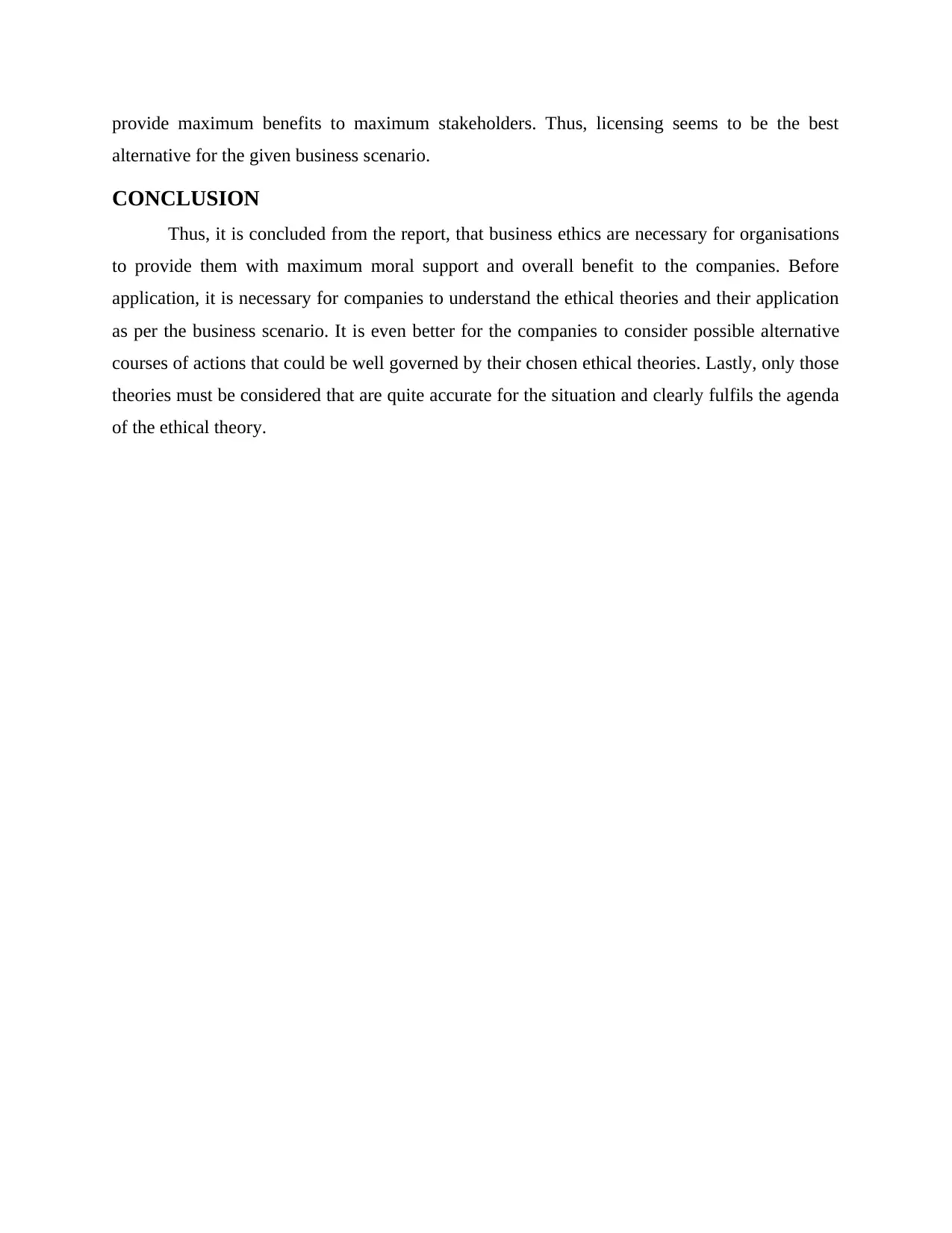
provide maximum benefits to maximum stakeholders. Thus, licensing seems to be the best
alternative for the given business scenario.
CONCLUSION
Thus, it is concluded from the report, that business ethics are necessary for organisations
to provide them with maximum moral support and overall benefit to the companies. Before
application, it is necessary for companies to understand the ethical theories and their application
as per the business scenario. It is even better for the companies to consider possible alternative
courses of actions that could be well governed by their chosen ethical theories. Lastly, only those
theories must be considered that are quite accurate for the situation and clearly fulfils the agenda
of the ethical theory.
alternative for the given business scenario.
CONCLUSION
Thus, it is concluded from the report, that business ethics are necessary for organisations
to provide them with maximum moral support and overall benefit to the companies. Before
application, it is necessary for companies to understand the ethical theories and their application
as per the business scenario. It is even better for the companies to consider possible alternative
courses of actions that could be well governed by their chosen ethical theories. Lastly, only those
theories must be considered that are quite accurate for the situation and clearly fulfils the agenda
of the ethical theory.
Paraphrase This Document
Need a fresh take? Get an instant paraphrase of this document with our AI Paraphraser
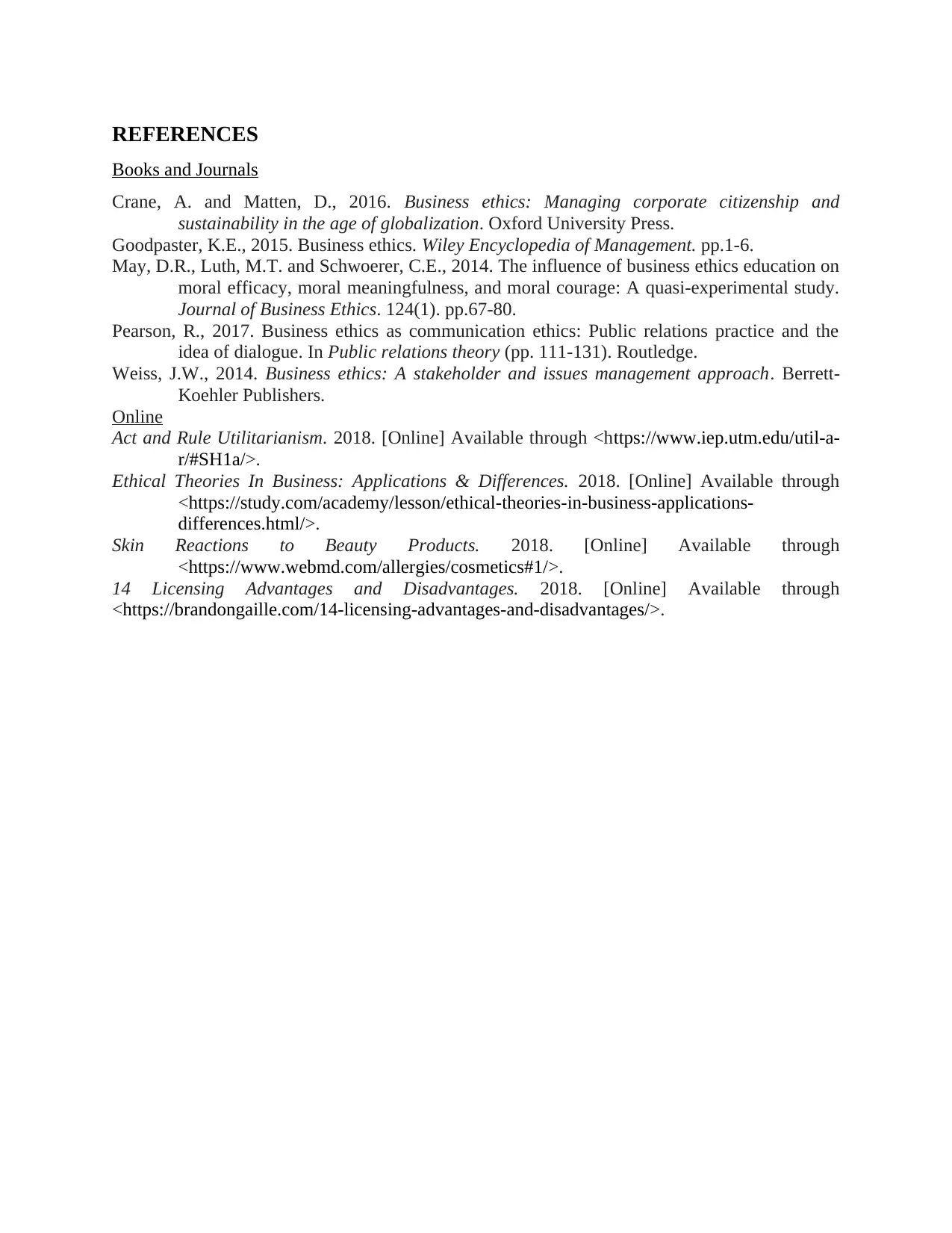
REFERENCES
Books and Journals
Crane, A. and Matten, D., 2016. Business ethics: Managing corporate citizenship and
sustainability in the age of globalization. Oxford University Press.
Goodpaster, K.E., 2015. Business ethics. Wiley Encyclopedia of Management. pp.1-6.
May, D.R., Luth, M.T. and Schwoerer, C.E., 2014. The influence of business ethics education on
moral efficacy, moral meaningfulness, and moral courage: A quasi-experimental study.
Journal of Business Ethics. 124(1). pp.67-80.
Pearson, R., 2017. Business ethics as communication ethics: Public relations practice and the
idea of dialogue. In Public relations theory (pp. 111-131). Routledge.
Weiss, J.W., 2014. Business ethics: A stakeholder and issues management approach. Berrett-
Koehler Publishers.
Online
Act and Rule Utilitarianism. 2018. [Online] Available through <https://www.iep.utm.edu/util-a-
r/#SH1a/>.
Ethical Theories In Business: Applications & Differences. 2018. [Online] Available through
<https://study.com/academy/lesson/ethical-theories-in-business-applications-
differences.html/>.
Skin Reactions to Beauty Products. 2018. [Online] Available through
<https://www.webmd.com/allergies/cosmetics#1/>.
14 Licensing Advantages and Disadvantages. 2018. [Online] Available through
<https://brandongaille.com/14-licensing-advantages-and-disadvantages/>.
Books and Journals
Crane, A. and Matten, D., 2016. Business ethics: Managing corporate citizenship and
sustainability in the age of globalization. Oxford University Press.
Goodpaster, K.E., 2015. Business ethics. Wiley Encyclopedia of Management. pp.1-6.
May, D.R., Luth, M.T. and Schwoerer, C.E., 2014. The influence of business ethics education on
moral efficacy, moral meaningfulness, and moral courage: A quasi-experimental study.
Journal of Business Ethics. 124(1). pp.67-80.
Pearson, R., 2017. Business ethics as communication ethics: Public relations practice and the
idea of dialogue. In Public relations theory (pp. 111-131). Routledge.
Weiss, J.W., 2014. Business ethics: A stakeholder and issues management approach. Berrett-
Koehler Publishers.
Online
Act and Rule Utilitarianism. 2018. [Online] Available through <https://www.iep.utm.edu/util-a-
r/#SH1a/>.
Ethical Theories In Business: Applications & Differences. 2018. [Online] Available through
<https://study.com/academy/lesson/ethical-theories-in-business-applications-
differences.html/>.
Skin Reactions to Beauty Products. 2018. [Online] Available through
<https://www.webmd.com/allergies/cosmetics#1/>.
14 Licensing Advantages and Disadvantages. 2018. [Online] Available through
<https://brandongaille.com/14-licensing-advantages-and-disadvantages/>.
1 out of 8
Related Documents
Your All-in-One AI-Powered Toolkit for Academic Success.
+13062052269
info@desklib.com
Available 24*7 on WhatsApp / Email
![[object Object]](/_next/static/media/star-bottom.7253800d.svg)
Unlock your academic potential
© 2024 | Zucol Services PVT LTD | All rights reserved.
